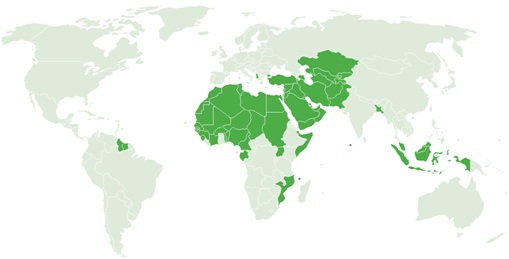The Organisation of Islamic Cooperation (OIC) is a global organization consisting of 57 member states representing over 1.6 billion Muslims globally. Established in 1969, the OIC seeks to promote solidarity, cooperation, and mutual support among its member states while safeguarding and protecting the rights and interests of Muslims worldwide. Additionally, the OIC works towards advancing the principles of human rights, justice, and democracy, while also promoting peace, stability, and prosperity in the Islamic world.

Functions of the OIC
One of the key functions of the OIC is to serve as a forum for political dialogue and cooperation among its member states. Through regular summits, ministerial meetings, and other forums, the OIC facilitates discussions on issues of mutual concern and develops coordinated strategies to address them.
Apart from its political functions, the OIC plays a crucial role in promoting economic cooperation and development among its member states. The organization has established several institutions and programs designed to support economic growth and development in the Islamic world, such as the Islamic Development Bank and the OIC Trade Preferential System.
Cultural and social cooperation among member states is another area in which the OIC is actively involved. The organization aims to preserve and promote Islamic culture and heritage, as well as promote dialogue and understanding among people of different faiths and cultures.
The OIC’s most significant role is in promoting and protecting the rights and interests of Muslims worldwide. The organization advocates for religious freedom and tolerance while also supporting the rights of Muslims living in minority communities.
As ‘the voice of the Muslim world,’ the OIC is an essential and influential organization in the Islamic world. Its commitment to promoting solidarity, cooperation, and mutual support among its member states has helped to foster greater stability and prosperity in the region, and has helped to promote greater understanding and dialogue among people of different faiths and cultures. Overall, the OIC continues to play an essential role in shaping the Islamic world’s political, economic, and social landscapes.
Member states of the OIC
The member states of the Organisation of Islamic Cooperation (OIC) are: Afghanistan, Albania, Algeria, Azerbaijan, Bahrain, Bangladesh, Benin, Brunei Darussalam, Burkina Faso, Cameroon, Chad, Comoros, Côte d’Ivoire, Djibouti, Egypt, Gabon, Gambia, Guinea, Guinea-Bissau, Guyana, Indonesia, Iran, Iraq, Jordan, Kazakhstan, Kuwait, Kyrgyzstan, Lebanon, Libya, Malaysia, Maldives, Mali, Mauritania, Morocco, Mozambique, Niger, Nigeria, Oman, Pakistan, Palestine, Qatar, Saudi Arabia, Senegal, Sierra Leone, Somalia, Sudan, Suriname, Syria, Tajikistan, Togo, Tunisia, Turkey, Turkmenistan, Uganda, United Arab Emirates (UAE), Uzbekistan, and Yemen.
The Islamic Reporting Initiative (IRI)
In 2015, EMG founded the Islamic Reporting Initiative, the world’s first reporting standard for sustainability based on Islamic values and principles. The OIC said the following about the Islamic Reporting Initiative:
The OIC is dedicated to preserving and promoting Islamic values of peace, equality, human dignity, and environmental prosperity. The IRI, in its journey towards making business responsible through the application of CSR and CSR reporting, has many values aligned with our own. The OIC commends the IRI in its efforts in promoting economic, social and environmental prosperity in a manner that is not only impact-oriented and sustainable, but culturally relevant and responsive.
Please click here to visit the website of the Islamic Reporting Initiative.

